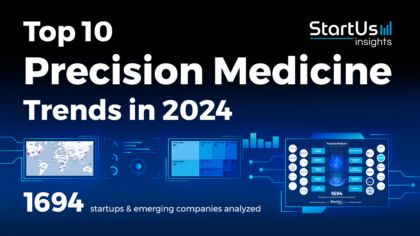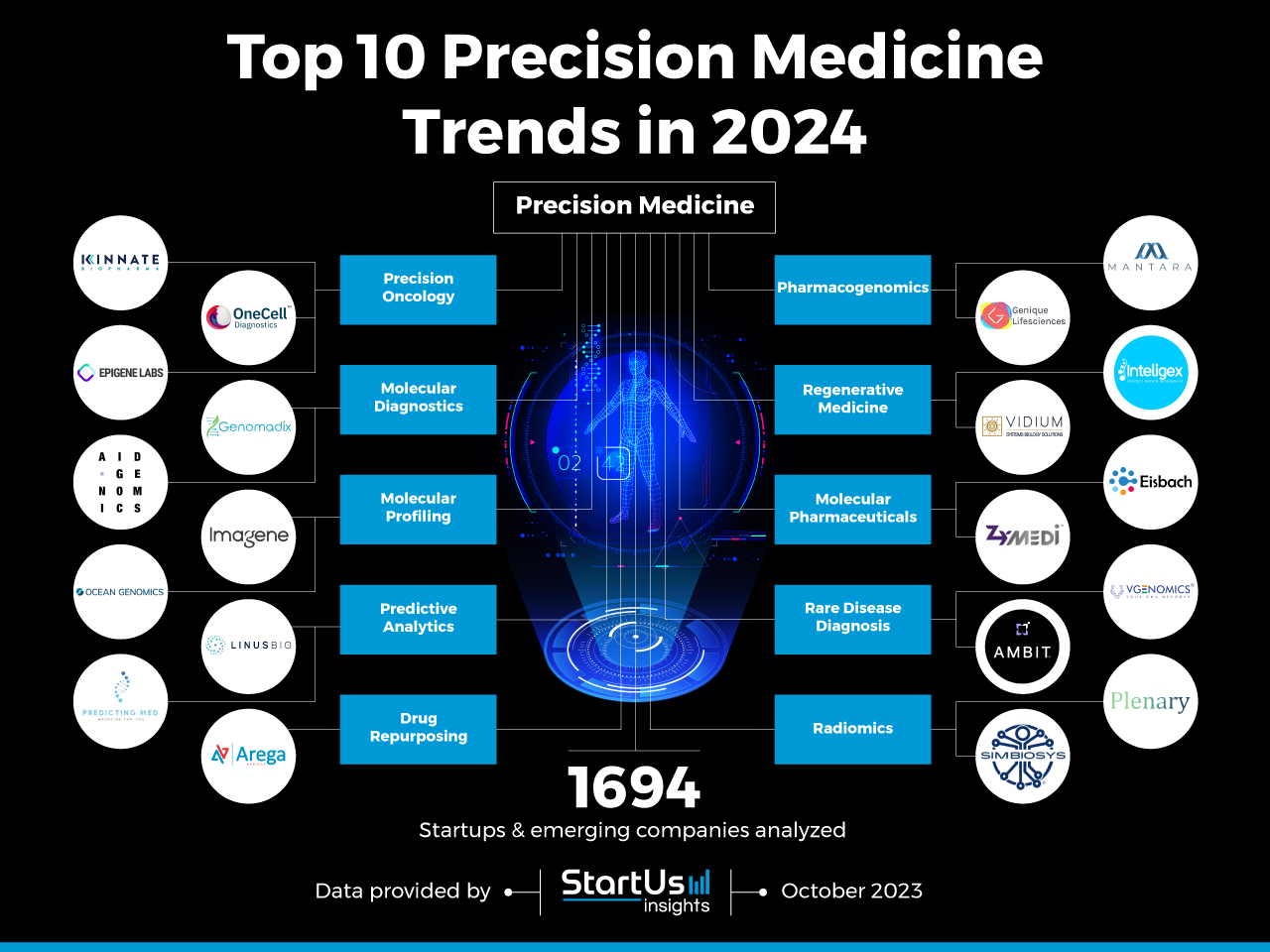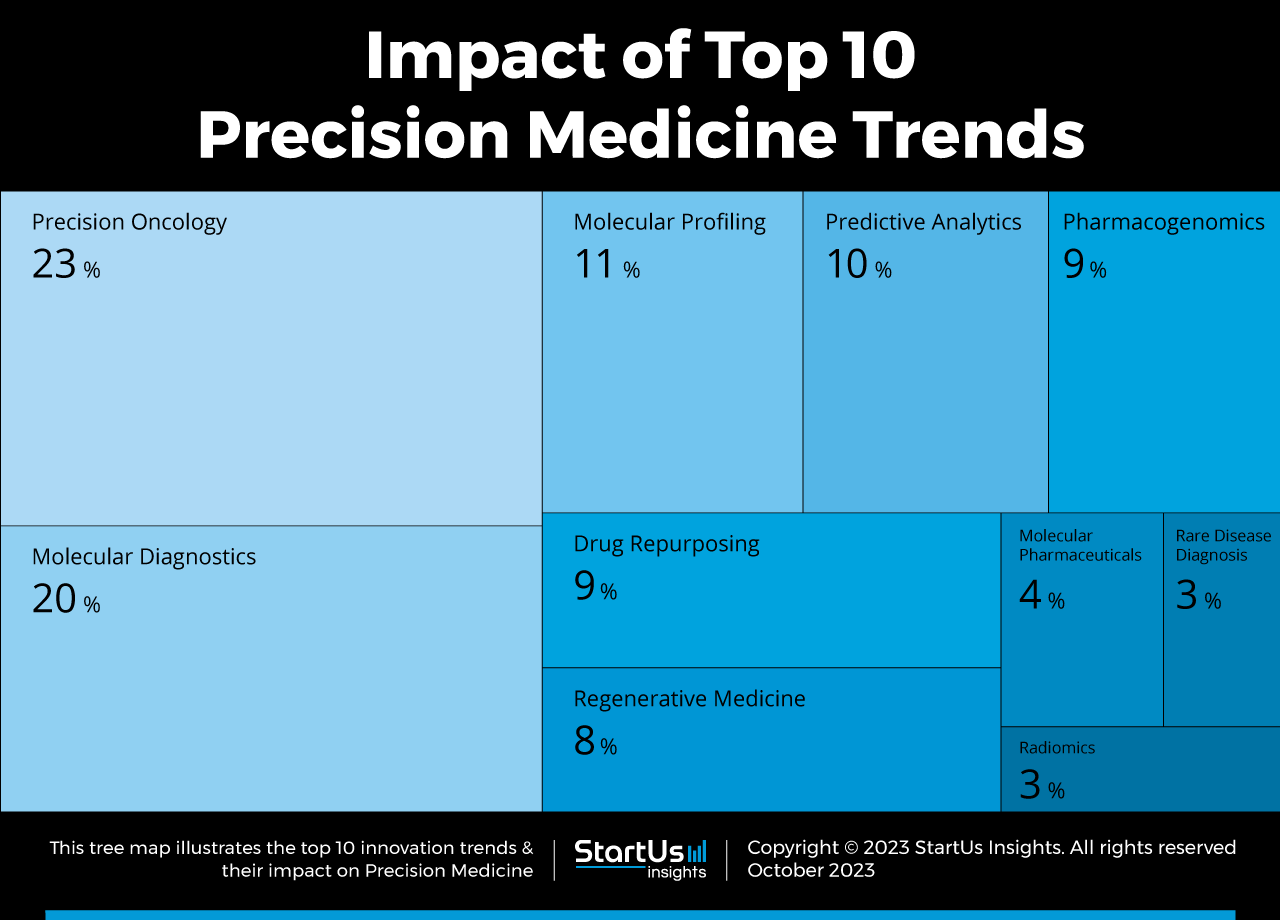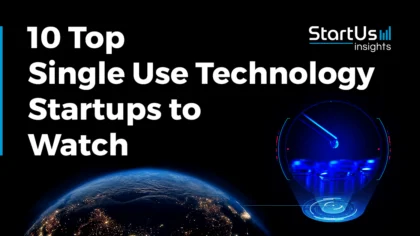Accelerate Productivity in 2025
Reignite Growth Despite the Global Slowdown
The pharma industry faces several challenges from differences in response to the same treatment among patients to adverse drug reactions and lack of patient stratification. To address these problems, startups are developing innovative technology solutions such as advanced genomic sequencing and AI-driven diagnostic tools, among more, to form the emerging trends in precision medicine.
Patient-specific smart drug solutions offer tailored treatments to individual genetic and molecular profiles, maximizing the likelihood of a positive response. These innovations provide more effective treatments and pave the way for reducing side effects, improving patient outcomes, and bolstering healthcare systems.
Top 10 Precision Medicine Trends (2024)
- Precision Oncology
- Molecular Diagnostics
- Molecular Profiling
- Predictive Analytics
- Pharmacogenomics
- Drug Repurposing
- Regenerative Medicine
- Molecular Pharmaceuticals
- Rare Disease Diagnosis
- Radiomics
Innovation Map outlines the Top 10 Precision Medicine Trends & 20 Promising Startups
For this in-depth research on the Top 10 Trends in Precision Medicine and startups, we analyzed a sample of 1694 global startups & scaleups. This data-driven research provides innovation intelligence that helps you improve strategic decision-making by giving you an overview of emerging technologies in the pharma industry. In the Precision Medicine Innovation Map below, you get a comprehensive overview of the innovation trends & startups that impact your company.
These insights are derived by working with our Big Data & Artificial Intelligence-powered StartUs Insights Discovery Platform, covering 3 790 000+ startups & scaleups globally. As the world’s largest resource for data on emerging companies, the SaaS platform enables you to identify relevant technologies and industry trends quickly & exhaustively.
Tree Map reveals the Impact of the Top Precision Medicine Trends
Based on the Precision Medicine Innovation Map, the Tree Map below illustrates the impact of the Top 10 Precision Medicine Trends. The top trend includes advancements in precision oncology, which uses targeted therapies based on the genetic makeup of tumors to ensure effective cancer treatment. Following this are molecular diagnostics and molecular profiling to help researchers delve deep into an individual’s genetic blueprint, identifying unique biomarkers that predict disease susceptibility or guide therapeutic decisions.
Besides this, predictive analytics employs advanced algorithms to forecast patient outcomes with pharmacogenomics tailoring drug therapies based on an individual’s genetic response, minimizing adverse reactions. The resurgence of drug repurposing identifies new therapeutic uses for existing drugs, optimizing their potential along with molecular pharmaceuticals to craft drugs at the molecular level.
Further, regenerative medicine advances tissue engineering and stem cell therapies for damaged organs. Lastly, the diagnosis of rare diseases is simplified and accelerated by pinpoint genetic testing while innovations in radiomics leverage advanced imaging to extract detailed cellular information, offering a more comprehensive view of diseases.
Global Startup Heat Map covers 1694 Precision Medicine Startups
The Global Startup Heat Map below highlights the global distribution of the 1694 exemplary startups & scaleups that we analyzed for this research. Created through the StartUs Insights Discovery Platform, the Heat Map reveals high startup activity in the US, followed by Europe as well as emerging startup activity in India, China, and South Korea.
Below, you get to meet 20 out of these 1600+ promising startups & scaleups as well as the solutions they develop. These precision or personalized medicine startups are hand-picked based on criteria such as founding year, location, funding raised & more. Depending on your specific needs, your top picks might look entirely different.
Interested in exploring all 1600+ precision medicine startups & scaleups?
Top 10 Precision Medicine Trends in 2024
1. Precision Oncology
Accurate tumor classification and predicting treatment responses remain challenging due to the vast genetic diversity and complexity of disease mechanisms leading to suboptimal patient outcomes. However, innovations in precision oncology are addressing these issues through advanced genomic sequencing techniques.
These techniques use AI to analyze tumor profiles and create targeted therapies that specifically attack cancer cells based on their unique genetic makeup. Such breakthroughs enhance the accuracy of cancer treatments, ensuring patients receive the most effective care tailored to their specific needs.
Kinnate Biopharma advances Genomically-defined Cancer Therapy
US-based startup Kinnate Biopharma specializes in the design and development of selective small molecules that target specific genetic mutations and fusions. The startup’s cancer treatments target proteins known as kinases using high selectivity, optimized pharmaceutical properties, broad genetic alteration coverage, and higher resistance.
Kinnate focuses on patients with known genetic drivers lacking targeted therapies, genetically characterized tumors resistant to existing treatments, or tumors that develop resistance over time. The startup’s pipeline includes compounds like Exarafenib Monotherapy and Exarafenib Combination, targeting BRAF and NRAS-driven cancers, and KIN-3248, addressing FGFR2/3 gene alterations in solid tumors.
OneCell Diagnostics offers Dynamic Data Analytics
OneCell Diagnostics is an Indian startup that develops dynamic data analytics to accelerate precision oncology. Its iCore Platform is an AI-enabled biomarker discovery tool that accelerates translational research, catering to laboratories, CROs, and biopharma. The platform automates primary and secondary analysis, enables biomarker data management, and fosters collaboration among medical researchers and professionals.
It also provides an integrated ecosystem for managing data-intensive, biomarker-rich precision medicine clinical trials. The startup’s approach combines liquid biopsy, NGS diagnostics, and cancer recurrence prediction tools to make cancer management more precise and personal.
Epigene Labs offers Cancer Drug Research Tools
Canadian startup Epigene Labs develops an augmented intelligence-based platform for precision oncology research and drug advancement. The startup’s mCUBE platform expedites data-driven drug discovery including biomarker identification and patient selection.
The platform uses a combination of publicly available data and proprietary data from partners and applies AI algorithms to process the data and generate insights. Epigene Lab’s solution delivers improvements in treatments for patients and bridges the gap between data analytics and oncological advancements.
2. Molecular Diagnostics
Individual genetic variations and the complex interactions between genes, proteins, and molecules within each patient make it difficult to accurately predict disease susceptibility and drug response. Molecular diagnostics tackle these hurdles by introducing tools that detect minute genetic changes through advanced biomarker identification and refining techniques to analyze individual molecular profiles.
Besides, high-throughput technologies allow for the rapid and comprehensive analysis of a patient’s molecular landscape. These advancements streamline the diagnostic process, ensuring more accurate disease detection and paving the way for tailored therapeutic interventions.
Genomadix creates a Molecular Analyzer
Canadian startup Genomadix creates a decentralized diagnostics platform that provides rapid results without requiring a lab. Its solution, the Genomadix Cube, is a swift, precise, and mobile-based DNA analyzer that uses a polymerase chain reaction (PCR) test to ensure accuracy during the first attempt.
The startup also creates a range of tests to detect COVID-19, legionella, CYP2C19 mutations, and Alzheimer’s disease. This technology brings the benefit of PCR to a portable format, making advanced lab testing accessible to a broader audience.
AID Genomics advances Genomic and Genetic Diagnostics
AID Genomics is an Israeli startup that develops genomic and genetic diagnostic products including a range of diagnostic tools like early colorectal cancer screening tests based on DNA methylation detection. Its non-invasive prenatal screening tool, NIFTY, offers high accuracy rates for detecting common trisomies and other genetic anomalies.
Further, its software solutions, such as AIDTES, automate and optimize qPCR analysis, featuring high accuracy rates. AID Genomics also contributes to the COVID-19 response, offering various testing services and innovative solutions like self-sampling kiosks. Besides this, the startup also develops genomic profiling solutions for cancer tissues to enable precise therapeutic recommendations.
3. Molecular Profiling
Traditional methods of data analysis are inadequate in handling the vast and intricate datasets associated with genetic and molecular makeup. Such data feature millions of genes and interactions. Innovations in molecular profiling are removing this obstacle by employing high-throughput technologies to analyze patients’ molecular landscape.
For example, advanced bioinformatics tools to interpret vast datasets and craft personalized treatment plans. Besides this, sophisticated algorithms sift through data, identifying patterns, and drawing meaningful conclusions about the best therapeutic strategies for each patient. These approaches also optimize therapeutic outcomes by aligning treatments with each patient’s unique molecular signature.
Imagene AI specializes in AI-based Molecular Profiling
US-based startup Imagene AI utilizes AI for real-time biomarker profiling. Its technology profiles a vast array of biomarkers directly from biopsy images, eliminating the need for additional tissue samples. Imagene AI’s solution offers real-time predictive and prognostic biomarker profiling, ensuring accuracy levels comparable to gold-standard tests.
The startup also specializes in non-small cell lung cancer (NSCLC) biomarker profiling using hematoxylin and eosin (H&E) whole slide images. Moreover, Imagene AI’s solutions remove the issues associated with traditional diagnostic processes which often miss certain biomarkers due to tissue adequacy issues or deploying expensive procedures.
Ocean Genomics creates an Intelligent Transcriptome Platform
Ocean Genomics is a US-based startup that creates an AI-based transcriptome platform to drive RNA-based innovation in precision medicine. Its TxomeAI and DiscoverAI computing platforms seamlessly integrate transcriptomics with other data sources, producing precise models for drug target and biomarker discovery.
The startup’s vast transcriptome database, DeepSea, powers these discoveries and analyses. By focusing on real-time biomarker profiling, Ocean Genomics predicts the biological impact of diseases and treatments. This approach enhances diagnostics, therapeutics, and eventually, patient treatment and outcomes.
4. Predictive Analytics
The intricate and diverse nature of individual health data promotes unpredictability in forecasting patient response to a specific treatment or disease progression over time. Moreover, this unpredictability is amplified by the myriad of factors influencing health, genetics, lifestyle, patient environment, and more.
Predictive analytics addresses these challenges by harnessing sophisticated algorithms that analyze vast datasets, integrating diverse patient information to generate actionable insights, and refining predictive models to enhance their accuracy. For instance, by understanding the genetic makeup of a tumor, clinicians predict the most effective chemotherapy drug, reducing the trial-and-error approach often used in cancer treatments.
Linus Biotechnology creates an Autism Diagnostic Aid
US-based startup LinusBio develops a diagnostic aid for Autism Spectrum Disorder (ASD) named StrandDx ASD. The test uses a strand of hair to map an individual’s unique biological response to environmental exposures. The startup’s approach integrates temporal exposomic sequencing, shedding light on the intricate relationship between environmental factors and autism development.
StrandDx ASD also captures the dynamics of over a dozen metals and elements, revealing systemic dysregulations in individuals with autism. The test’s data set, encompassing various molecular signatures, undergoes advanced computational analysis to predict autism. This method offers precise diagnostics to detect autism earlier and facilitate tailored interventions.
Predicting Med offers a Pancreatic Cancer Decision Support Platform
Predicting Med is a French startup that advances targeted therapies and predictive medicine through its molecular test, Pancreas View. It offers both prognosis and theranostic insights for pancreatic cancers, aiding oncologists in decision-making. Predicting Med provides healthcare professionals with the necessary information to optimize treatment decisions and implement targeted therapies. It emphasizes the importance of treatments based on individual genotypes, ensuring precise and effective care.
5. Pharmacogenomics
The vast variability in the differences between individual metabolism and response to drugs leads to patients receiving inefficient drugs or adverse reactions that can range from mild discomfort to severe complications. For this reason, startups are advancing pharmacogenomics by studying the genetic factors influencing drug effects and developing tests that predict individual drug responses.
Besides this, other innovations in the field include guided medication selection and dosing based on a patient’s genetic makeup. These advancements ensure that patients receive drugs that are most likely to be effective and least likely to cause harmful side effects.
Mantara Health tests Drug-Gene Interaction
UK-based startup Mantara Health creates a test to understand the effect of metabolized medications using the Mantara PGx DNA Test. The test analyzes an individual’s DNA to determine potential drug-gene interactions. By examining specific genes related to medication metabolism, the test provides insights into drugs that might cause side effects or require dosage adjustments.
The process involves ordering a test kit, providing a saliva sample, and sending it for laboratory analysis. Once analyzed, a personalized PGx report is generated, detailing genes tested and highlighting medications of concern based on genetic makeup. This method assists healthcare professionals in tailoring prescriptions, ensuring safer and more effective treatments.
DeepKnomics delivers Pharmacogenomics Reporting
Genique Lifesciences is an Indian startup that enhances health outcomes by translating DNA-based insights for both clinicians and patients. Its product, GeniqueCARE, provides insight into the body’s reaction to medication, predicts drug efficacy, and identifies potential adverse reactions based on genetic composition.
The platform investigates genetic markers across various medical domains, linking genetics to personalized medicine. This platform examines a large number of genetic markers, concerning traits and genes, offering a broad scope in predicting drug effectiveness. It bridges the gap between genetics and personalized medication, accentuating the role of genetic understanding in enhancing drug efficacy.

6. Drug Repurposing
Many medical treatments require prolonged timelines or exorbitant costs due to the development of new targeted therapies from scratch. To add, they also face other problems such as data inconsistency and patient stratification. Drug repurposing addresses this by identifying existing drugs, previously approved for other conditions, that show potential in new therapeutic areas.
Further, through advanced AI and machine learning, researchers predict drug interactions and potential side effects more efficiently, accelerating the path to treatment for patients. Importantly, it significantly reduces development costs. This approach ensures that effective therapies reach patients faster, capitalizing on the existing wealth of pharmaceutical knowledge.
Arega Medical provides Repurposed Precision Treatments
Belgian startup Arega Medical develops repurposed drugs for previously untreatable diseases. The startup’s range of solutions includes treatments for diseases with high unmet medical needs, such as brain disorders, some cardiovascular diseases, and inflammatory bowel diseases.
One of its lead compounds is a PDE4 inhibitor that targets cognitive impairments due to stroke and Alzheimer’s disease. In the cardiovascular domain, Arega Medical develops treatments for resistant hypertension and chronic heart failure with preserved ejection fraction (HFpEF) and for inflammatory bowel diseases, an optimized thiopurine.
7. Regenerative Medicine
Traditional treatments often address symptoms rather than underlying causes, especially in chronic and degenerative diseases. Additionally, the rapid evolution of pathogens and the rise of antibiotic-resistant strains further complicate treatment strategies. Therefore, startups are developing regenerative medicine therapies that entirely restore or replace damaged tissues and organs.
For example, cultivating stem cells and engineering tissues to predict disease progression or optimize treatment plans. Other innovations include advanced new biomaterials and nanotechnology to target specific cellular pathways and deliver therapeutic agents more effectively. These techniques alleviate symptoms but mainly aim to restore damaged cells or tissue. With advancements in AI, such solutions are more precise today, aligning with every patient’s unique genetic and molecular profile.
Inteligex advances Stem Cell Therapy
Inteligex is a Canadian startup that specializes in stem cell and drug-based therapies for traumatic spinal cord injuries (SCI) and central nervous system (CNS) diseases. It introduces its Spinal Microenvironment Modifying and Regenerative Therapeutic (SMaRT) cells.
The cells feature a cervical spinal cord-specific identity, ensuring better integration with host tissues. Additionally, SMaRT cells produce glial-derived neurotrophic factor (GDNF) to support both transplanted and native cell survival. The startup’s technology overcomes the current barriers to SCI and CNS treatments such as poor transplant survival, formation of incorrect cell types, or inhibitory scar formations.
Vidium Solutions facilitates Cell Differentiation
French startup Vidium Solutions advances drug discovery and regenerative medicine by deciphering the differentiation process in both homeostasis and disease states. Its “R.E.A.L” or Retro-Engineering Augmented Learning platform offers three main solutions: omics data analysis, genetic dynamic characterization, and in silico modeling.
The startup’s platform identifies the genes involved in cell fate decisions and maps its genetic regulatory networks. It also pinpoints therapeutic targets, early markers, and robust treatments or drug combinations. Vidium’s approach integrates systems biology, providing tailored solutions that address a wide range of complex biological problems.
8. Molecular Pharmaceuticals
Precision medicine faces numerous obstacles, including the difficulty of delivering targeted therapies that modulate specific molecular pathways associated with the disease without harming healthy cells. Emerging trends in molecular pharmaceuticals involve designing drugs at the molecular level and tailoring them to interact precisely with specific proteins or genes associated with disease.
Moreover, researchers are synthesizing molecules with high specificity and affinity, ensuring that these drugs target only the intended molecular targets, minimizing side effects. Further, by incorporating real-time monitoring systems, medical professionals track the evolution of diseases and adjust treatments accordingly to ensure maximum therapeutic benefit.
Eisbach Bio manufactures Smart Drugs
German startup Eisbach Bio specializes in smart drugs that target molecular machines involved in genome reorganization. The startup uses the concept of synthetic lethality, which exploits the unique molecular vulnerabilities present in validated cancer targets. Its ALLOS platform focuses on the molecular machines essential for the dynamic reorganization of the cancer genome.
Further, ALLOS enables crafting drugs that are effective, selective, and exhibit fewer side effects compared to traditional methods. One of its primary targets is ALC1, a chromatin-remodeling enzyme that modulates DNA damage and repair. Another target is CHD1, which plays a role in DNA repair and impacts the tumor microenvironment.
Zymedi provides Small Molecule Compounds
Zymedi is a South Korean startup that specializes in therapeutics for diseases with no standard care or effective therapy. Its in-house drug discovery platform, HOMEOS, sheds light on the biology of aminoacyl-tRNA synthetases (ARSs) and develops a pipeline of drugs. Zymedi’s small molecule compound for NASH targets the pro-inflammatory activities of KARS1.
Its compound, ZMC001, binds to KARS1 and selectively inhibits key inflammatory pathways. NASH, a severe form of nonalcoholic fatty liver disease, currently lacks effective treatments, making ZMC001‘s development crucial. Moreover, in animal models, ZMC001 has shown significant improvement in reducing steatosis and lobular inflammation.
9. Rare Disease Diagnosis
Rare diseases often manifest with non-specific symptoms, making them prone to misdiagnosis, which results in delayed or unsuitable treatments. This is being addressed through innovations in rare disease diagnosis such as advanced genetic sequencing technologies, comprehensive patient databases, and advanced machine learning algorithms.
These solutions identify patterns and markers specific to rare conditions and also analyze large-scale patient data to offer predictive insights. Such innovations expedite the diagnostic process, ensuring that patients with rare diseases receive timely and accurate diagnoses, paving the way for tailored therapeutic interventions.
genix.ai offers Genomic Precision Medicine
Genix.ai is an Indian startup that focuses on genomic precision medicine, particularly in diagnosing rare diseases. The startup deploys predictive algorithms for clinical investigations and profiling genetic conditions. It offers high standards in sample collection, preparation, and data processing, offering services like whole exome sequencing and RNA-Seq.
Genix.ai’s cloud-based tools also provide up-to-date databanks and AI-powered pipelines for accurate clinical reports. Its system works by collecting samples, processing them in the lab, and delivering reports in a short timeframe. Moreover, the startup’s database currently covers 20 million variants related to human genetic markers in rare diseases.
Ensho Health Intelligent Systems provides Electronic Health Record Analytics
Canadian startup Ensho Health develops machine-learning algorithms to detect rare and complex diseases with electronic health records (EHR). The algorithms assist physicians in diagnosing diseases earlier and initiating timely and appropriate treatments. The startup also offers digital diagnostics for various disorders, including cardiac, neurologic, rheumatic, and hematologic conditions.
The startup’s EMR-agnostic aEDC system, Apollo, provides on-demand health data analysis and features optical character recognition to extract data from various document types. It then deploys natural language processing (NLP) techniques to extract specialty-specific data. This technology provides detailed and transparent reports on predictions while emphasizing privacy and implementing encryption protocols.
10. Radiomics
Standard imaging technology poses the risk of creating incomplete tumor profiles or misinterpreting disease progression. Additionally, the integration of genomic, clinical, and imaging data often causes interoperability issues and further increases the time to make medical decisions. Startups are developing radiomics solutions to address these challenges by extracting a comprehensive array of quantitative features from medical images to transform visuals into mineable data.
Further, cloud-based platforms harness the power of machine learning algorithms to analyze these features and correlate them with genomic, clinical, environmental, and lifestyle data. This multi-dimensional analysis offers insights into tumor heterogeneity, progression, and response to therapy, as well as potential environmental triggers and genetic predispositions.
PlenaryAI offers Precision Radiomics as a Service
US-based startup PlenaryAI improves clinical outcomes by offering Precision as a Service in the realm of radiomics. The startup provides physicians with tailored AI tools that focus on data analysis for diverse medical conditions, especially in clinical imaging. It also integrates relevant biomarkers with multi-modality imaging, aiming for precise healthcare insights.
PlenaryAI’s technology, particularly in molecular imaging, captures dynamic biochemical processes non-invasively and highlights early disease indicators. By merging molecular imaging with anatomic modalities and fluid-based biomarkers, the startup facilitates early, actionable therapeutic decisions.
SimBioSys specailzies in Computational Oncology
SimBioSys is a US-based startup that develops a platform to integrate patient-specific data with advanced spatially-resolved biological simulations and model cancer behavior to therapeutics. It utilizes standard care data, enriched with AI, to create a virtual tumor, offering insights into tumor morphology, blood vessel positioning, and tissue composition.
Besides this, the biophysical modeling and simulations capture the intricate biochemical interactions within tumors, allowing for personalized treatment simulations. By combining major cancer hallmarks, such as drug delivery, sensitivity, metabolism, and spatial heterogeneity, SimBioSys offers a comprehensive understanding of cancers.
Discover all Precision Medicine Trends, Technologies & Startups
The future trends in precision medicine show potential with synthetic genomics that enables the design and construction of custom DNA sequences, opening doors to numerous applications in medicine, bioenergy, and agriculture. Additionally, biosensors advance the development of novel capabilities, such as detecting and responding to environmental signals or enhancing control in bioprocessing.
The precision medicine trends and startups outlined in this report only scratch the surface of trends that we identified during our data-driven innovation & startup scouting process. Identifying new opportunities & emerging technologies to implement into your business goes a long way in gaining a competitive advantage.





![10 Top Blockchain Solutions for Pharma Industry [2025]](https://www.startus-insights.com/wp-content/uploads/2025/06/Pharma-Blockchain-Startups-SharedImg-StartUs-Insights-noresize-420x236.webp)





